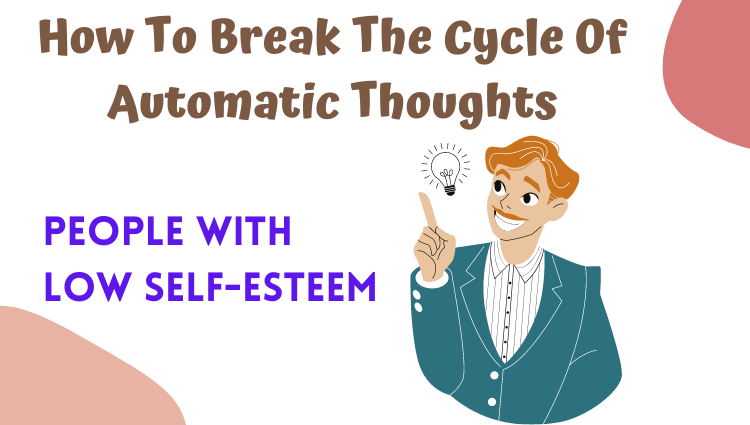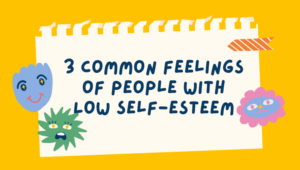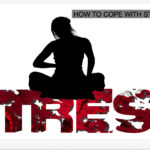Cognitive Behavioral Therapy (CBT) is a form of therapy that emphasizes the role of thoughts in how we feel and what we do. It’s a problem-solving approach that can help you change unhelpful or unhealthy patterns of thinking and behaving. If you’re stuck in a cycle of automatic thoughts that are negative and self-defeating, CBT can help you break free from that cycle and learn to think in a more helpful way. In this blog post, we’ll explore how CBT can help you break the cycle of automatic thoughts and 4 common automatic thoughts of people with low self-esteem.

What Are Automatic Thoughts?
If you’re like most people, your mind is full of automatic thoughts. These are the thoughts that come to mind without you even realizing it. They’re usually negative and can be about yourself, other people, or the world in general.
Automatic thoughts can be really harmful because they can keep you from thinking clearly and can make you feel bad about yourself.
The good news is that there is a way to break the cycle of automatic thoughts. CBT is a type of therapy that helps you to understand and change the way you think about things. It can be really helpful in breaking the cycle of automatic thoughts.
How To Overcome Automatic Thoughts With CBT
Step 1: Identify the negative thought
The first step is to become aware of the negative thoughts that are running through your head. This can be tricky, because we often don’t realize we’re having them.
But there are some tell-tale signs that a thought is negative and automatic.
• It’s usually about yourself (“I’m not good enough”), rather than about the situation (“This presentation is going to be a disaster”).
• It’s usually based on emotions like fear, worry, or insecurity.
• It’s often a generalization (“I always fail”), rather than something specific (“I didn’t do well on that one test”).
• It’s usually negative (“I can’t do it”), rather than positive or neutral (“I can do it”).
• It’s often a self-fulfilling prophecy (“I’m going to fail”), rather than something based on evidence (“I’ve failed before, so I’ll probably fail again”).
If you’re not sure whether a thought is negative and automatic, try asking yourself these questions:
• Is the thought helpful?
• Does it make me feel better or worse?
• Does it make the situation better or worse?
• Is it based on evidence or on my feelings?
• Is it something I would say to a friend?
If the answer to any of these questions is “no,” then the thought is probably negative and automatic.
Step 2: Question the thought
Once you’ve identified a negative thought, the next step is to question it. This means taking a closer look at the thought and asking yourself whether it’s really true.
Here are some questions you can ask yourself.
• What evidence do I have for this thought?
• Is there any evidence that contradicts this thought?
• What would I say to someone else who was having this thought?
• How would I feel if I didn’t have this thought?
• What’s the worst thing that could happen if this thought is true?
• What’s the best thing that could happen if this thought is not true?
Step 3: Choose a more helpful thought
After you’ve questioned the negative thought, it’s time to choose a more helpful thought. This thought should be based on evidence, rather than on your emotions.
It should also be something that you would say to a friend.
Here are some examples of more helpful thoughts.
• “I can do this.”
• “I’m not perfect, but I’m good enough.”
• “I’m not sure what will happen, but I’ll handle it.”
• “I made a mistake, but I can learn from it.”
• “I’m feeling scared, but I’ll be okay.”
• “Other people have gone through this, and so can I.”
4 Common Automatic Thoughts Of People With Low Self-Esteem
A lot of people with low self-esteem have common automatic thoughts that can really hold them back in life.
1. “Because I failed this project, I’ll never succeed.”
One of the most common automatic thoughts people with low self-esteem have is “Because I failed this project, I’ll never succeed.” They tend to have this type of cognitive distortion, Overgeneralization.
This kind of thinking is actually really harmful and can prevent you from ever reaching your full potential. If you’re constantly telling yourself that you’re not good enough, then you’ll never try to improve or do better.
It’s vital to remember that just because you had one negative experience, it doesn’t mean that you will always have negative experiences. You might not always succeed, but that doesn’t mean you’re a failure. Everyone experiences setbacks at times. The key is to learn from your mistakes and to keep trying.
It’s also important to catch these thoughts and reframe them in a more positive light. Instead of telling yourself that you’re going to fail, try telling yourself that you can learn from your mistakes and that you will eventually succeed if you keep trying.
2. “Because I didn’t do it perfectly, it’s no good at all”
It’s easy to fall into the trap of thinking that because we didn’t do something perfectly, it’s no good at all.This is a common automatic thought people with low self-esteem have. We beat ourselves up for not being perfect, and then we convince ourselves that we’re not good enough.
The problem with this thinking is that it’s just not true! We are all imperfect beings, and that’s okay. It’s actually what makes us unique and special.
So, next time you find yourself thinking that you’re not good enough because you didn’t do something perfectly, remind yourself that you’re just like everyone else. We all have our own imperfections, and that’s what makes us beautiful.
3. “If I can’t be perfect, I might as well not even start.”
If you have low self-esteem, you might find yourself thinking “If I can’t be perfect, I might as well not even start.”
It’s a way of protecting yourself from disappointment. If you think you can’t be perfect, then you won’t be disappointed when you’re not.
The problem with this thinking is that it keeps you from trying new things. It’s like you’re saying to yourself “I can’t do this, so why bother?”
This kind of thinking is a self-fulfilling prophecy. If you believe you can’t do something, you probably won’t even try. And if you don’t try, you’ll never know what you’re capable of.
The next time you find yourself thinking “If I can’t be perfect, I might as well not even start,” try to catch yourself. remind yourself that you’re only human and that it’s okay to make mistakes.
And then, go ahead and give it a try. You might be surprised at what you can accomplish.
4. “Because I’m overweight, I don’t matter as much as others who are in shape.”
This thought is harmful for a few reasons.
First of all, it’s not true! You matter just as much as anyone else, no matter what your weight is. Secondly, even if it were true, why would that be a reason to not matter? Your weight doesn’t define you as a person.
Someone’s weight does not determine their worth as a person. Everyone is worthy of love, respect, and happiness, no matter their size. If you are struggling with this negative thought, it is important to remind yourself that you are not your weight. You are so much more than a number on the scale.
If you find yourself thinking this thought, try to challenge it. Ask yourself why you believe it and whether or not there’s any evidence to support it. Chances are, you’ll realize that it’s not true and that you’re just as worthy and valuable as anyone else.
Conclusion
If you find that you can’t break the cycle of negative thinking on your own, it may be time to seek professional help. A therapist can help you identify the thoughts, challenge them, and replace them with more positive ones.
Breaking the cycle of negative thinking is a process, but it’s one that is possible to achieve. With time and effort, you can start to build a more positive self-image and improve your self-esteem.






